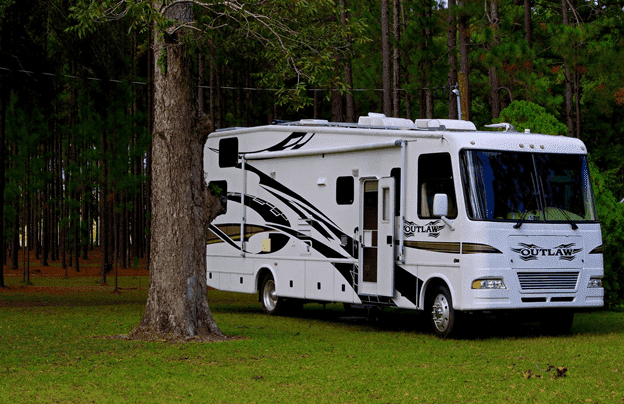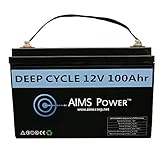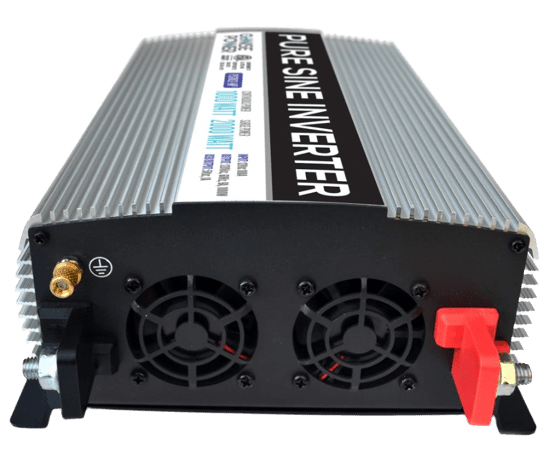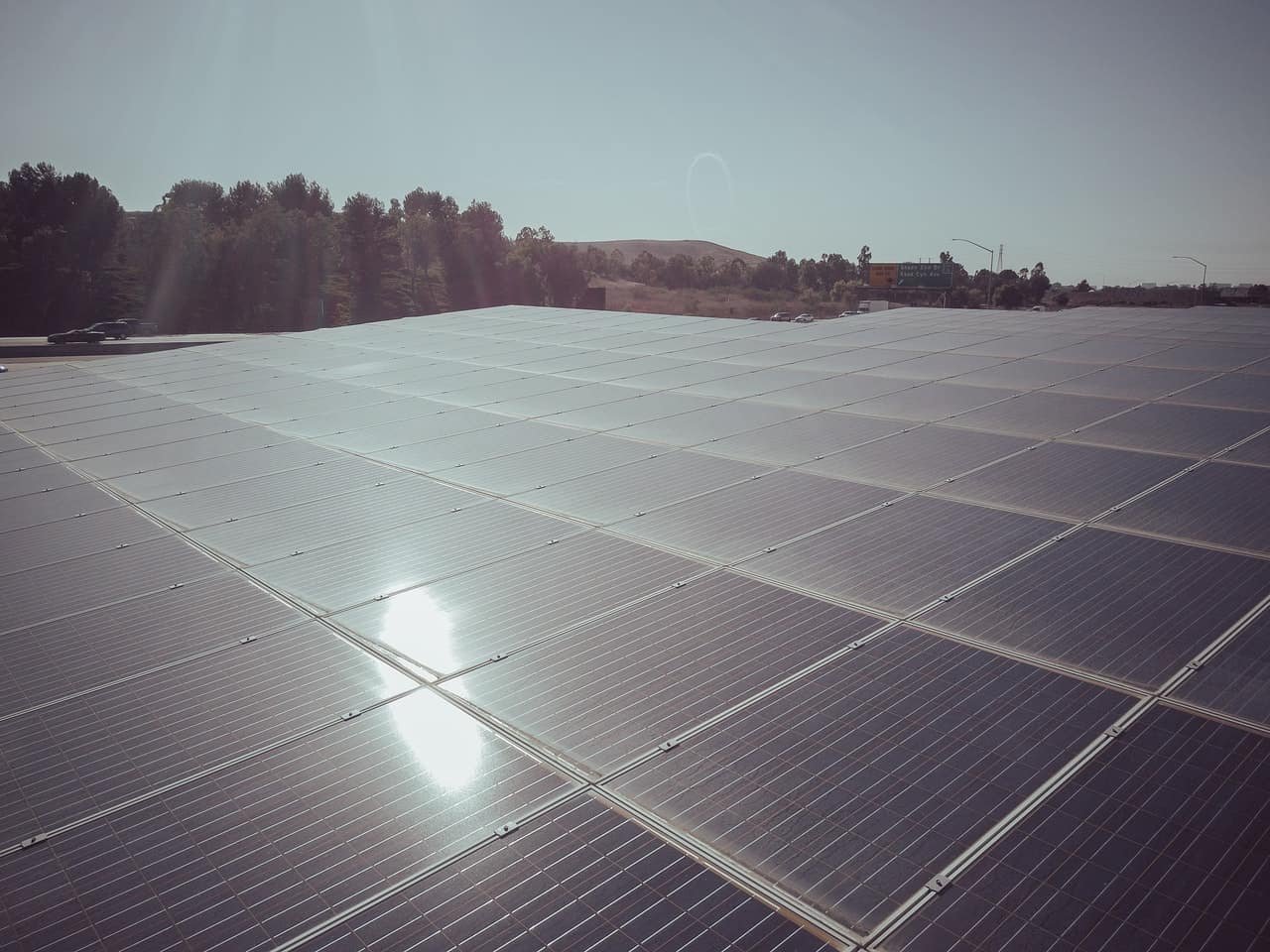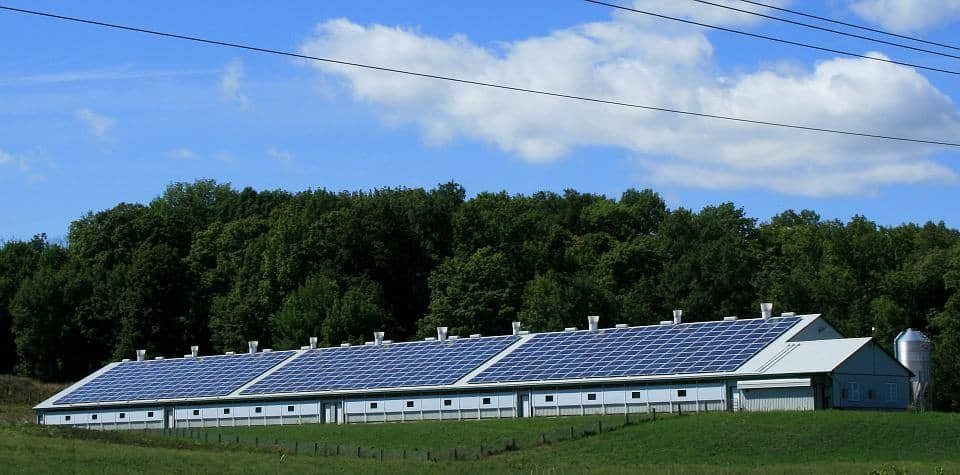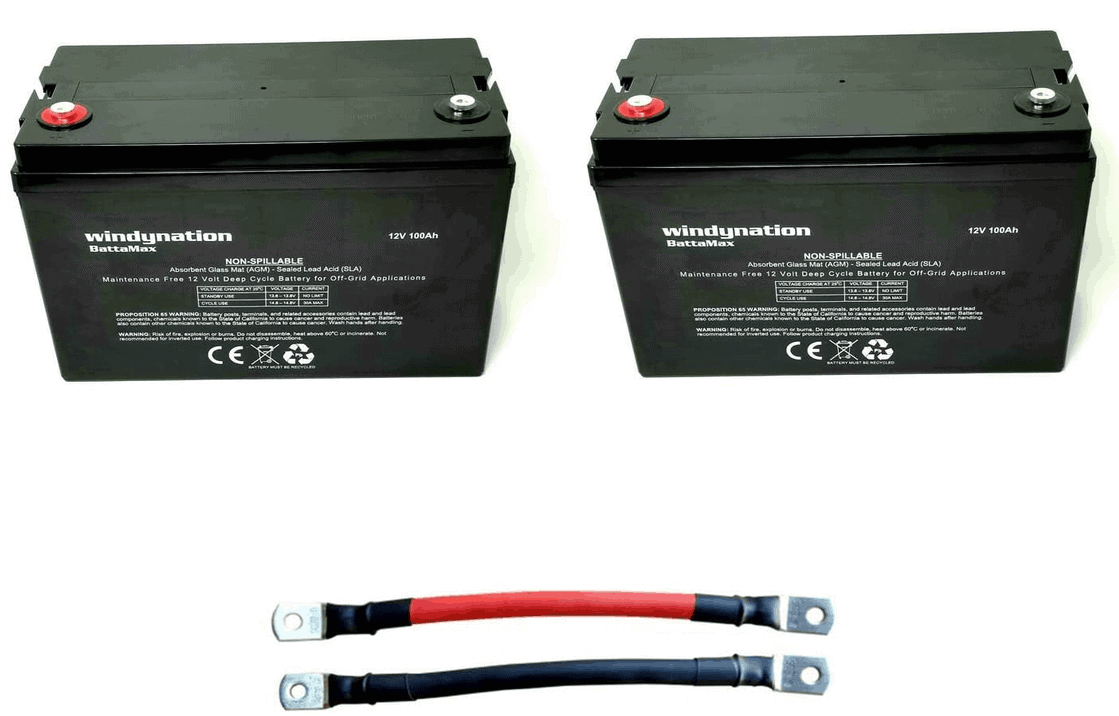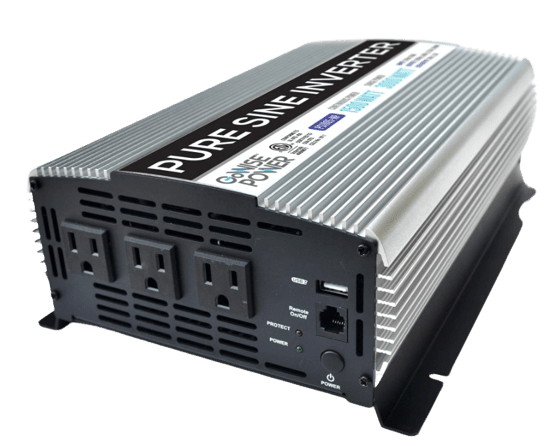RVs have always been a popular choice among people interested in experiencing life away from the hustle and bustle of the city. These vehicles run on fuel, similar to other automobiles.
However, many of the electrical components and appliances they contain require electrical power from an external source.
The electrical portions of an RV’s engine run on 12-volt DC electrical power, while the electrical appliances and power outlets in the vehicle run on a 120-volt AC system. The power for each of these components is usually provided by a type of battery.
These batteries allow the electrical systems on RVs to operate even when they are not plugged into a charging station. However, solar panels are quickly gaining popularity as an environmentally-friendly charging solution for RV batteries.
Let’s take a look at the best batteries for RV solar power.
RV solar power refers to the battery recharging systems in RVs that are powered by solar energy. In this set-up, solar panels are connected to special deep cycle batteries that are charged up when exposed to sunlight.
Top Picks Batteries for RV Solar Power
Why Do People Use RV Solar Power?
RVs that use solar power can be taken anywhere where there is ample sunlight. These systems free you from the hassle of needing to park your vehicle in a designated RV park for charging.
This can be especially useful for people who like to take their temporary mobile homes off-grid for extended periods.
In addition to offering charging capabilities on-the-go, solar systems are a more environmentally friendly option compared to plugging your vehicle into an electrical outlet. This makes them a preferable option in regions where electricity is generated from fossil fuels and other carbon-emitting sources.
Can Solar Panels Power My RV?
After hearing the term “RV solar power”, many people assume that the entire RV is powered by solar energy. However, this is untrue. Your vehicle’s engine and mechanical components will still run on a traditional fuel source such as diesel or gas, but the electrical components connected to the engine and electrical appliances will be powered by batteries.
Starter vs House Batteries
Solar RVs contain two sets of batteries. The battery responsible for starting your vehicle is known as the starter battery, while the battery that powers electrical appliances and power outlets is known as the house battery.
The starter battery is your typical car battery that uses a jolt of electrical current to start your vehicle. They usually feature many thin plates exposed to an electrolyte.
This allows them to channel large electrical currents in short bursts. However, they aren’t suitable for deep cycle applications that require a steady supply of power.
House batteries may sound similar to starter batteries, as both usually typically 12 volts. However, these are deep cycle batteries with thick plates. They are built to withstand several recharge and discharge cycles, and offer a steady supply of power to electrical appliances in your RV.
In this review guide, we will be looking at different house battery options for solar RVs.
Types of RV Batteries
RVs generally use deep cycle batteries which are suited for multiple discharge-recharge cycles. The some of the most popular types of deep cycle batteries are discussed below.
Flooded Lead-Acid Batteries
Flooded lead-acid batteries are among the popular batteries used today. They come in many different shapes and sizes and can be used for a variety of industrial applications.
These batteries are referred to as “flooded” because they contain metal plates submerged in a liquid electrolyte.
The negative plates on lead acid batteries are made from lead antimony, while their positive plates are made from lead dioxide. The “acid” in the battery name refers to the sulfuric acid produced when the battery is being charged up.
As the plate discharges, this acid is replaced by water that forms within the battery housing.
Flooded lead-acid batteries are among the cheapest RV battery options available. However, they require regular maintenance. This includes activities such as watering, cleaning, and equalizing their contents.
These batteries also need to be set up in a well-ventilated space while remaining protected from the elements. These traits make flooded lead-acid batteries less suitable for RV solar power setups.
Lithium-Ion Batteries
Lithium ion batteries have existed for several decades. This deep cycle battery type contains lithium ions that migrate between a cathode and an anode. They come in various sizes and forms, but the one most commonly used for RVs is the lithium iron phosphate variety.
These batteries are favored for their compact size, stability, and long-lifespan. In addition to this, they feature a flat discharge curve, and weigh less than flooded lead-acid batteries. However, these batteries tend to be more expensive than other varieties.
They also require temperature regulation if you wish to use them in freezing conditions. https://gpelectric.com/choosing-batteries-for-rv/
AGM Batteries
AGM stands for absorbent glass mat. These batteries gained popularity in 1980s for their relatively light weight and durability. The absorbent glass mat in their housing absorbs any sulfuric acid and prevents it from leaking outside the battery.
RV users may prefer an AGM battery due to their low internal resistance and high current output. This ensures a long battery lifespan with little to no required maintenance.
These can function at temperatures between -4°F and 113°F, which means they can be relied on in a variety of situations. https://www.trojanbattery.com/pdf/AGM_Trojan_ProductLineSheet.pdf
However, RV owners should avoid placing these batteries directly next to their engine, as temperatures regularly exceed 113°F in the areas surrounding them. AGM battery manufacturers recommend stopping charging if the battery core temperature reaches 48°F or higher. (Batteryuniversity)
Gel Batteries
Gelled lead-acid batteries have been around since the 1950s. They contain sulfuric acid combined with a silica gelling agent to produce a gel-like paste.
These batteries have a longer lifespan than AGM batteries due to their internal heat transfer mechanisms. Ordinary AGM batteries trap and insulate the heat they produce, while gel batteries transfer this heat outside their casing.
Gel batteries are:
- last for 600 – 800 charges while AGM batteries last around 400 charges
- also, perform well at high temperatures
- less susceptible to sulfation compared to other battery systems
- these batteries usually possess higher resistance than AGM batteries, which makes them less suitable for use with electrical appliances with high current requirements
This high resistance can be attributed to the pores within the gel matrix of these batteries. The pores contained within are very narrow, making the ions more confined.
Gel batteries are a special type of flooded battery. In this battery type, all oxygen circulation occurs within cracks in the gel structure.
To function at their best, they need to be kept in a well-ventilated area. By contrast AGM batteries feature a gap in their structure that promotes internal ventilation.
Despite the many advantages gel batteries offer, many RV owners steer clear of these due to their slow charging rate and low voltage. In addition to this, if a gel battery is overcharged, its cells may get permanently damaged. WHAT YOU NEED TO KNOW ABOUT YOUR RV BATTERIES
How Many Batteries Does an RV Need?
The number of batteries your RV requires will depend on your needs. Lead acid batteries usually contain cells in a series. Each of these cells produces 2.1 volts. If you have a 12 volt battery with six cells in series, the output voltage produced would be 12.6 volts.
If your power requirements aren’t out of the ordinary, a simple 12 volt battery should suffice for powering the electrical appliances in your RV. However, the battery capacity can vary greatly depending on the number of batteries in your system.
This battery capacity is usually denoted in amp hours (AH). Amp hours describe the number of amps a battery can deliver for a specified number of hours before it discharges completely.
A battery with 150 amp hours will be able to deliver 30 amps for 5 hours, or 15 amps for 10 hours.
Another term is known as “reserve capacity” describes the number of minutes a battery with a full charge can deliver 25 amps before dropping under 10.5 volts. Battery Basics: A Layman’s Guide to Batteries
RV batteries are usually sold in different group sizes, measured as 24, 27, or 31. A larger group size typically means the battery can provide power for longer before discharging.
However it’s also possible to use multiple batteries of the same group size to increase your RV’s house battery capacity.
A group 27 AGM deep cycle battery offers 66 . While two group 27 batteries connected in parallel will offer 132 – 220 Ah.
Best Batteries for a Solar Powered RV Reviews
Best Value Solar Battery
AIMS 12V 100Ah LiFePO4
The 12v 100 AH LiFePO4 battery from AIMS is the perfect fit for the job. This RV battery is rated for up to 4000 charge/discharge cycles and charges up quickly. It can withstand high temperatures and delivers full power up till the point it is fully discharged.
We’ve looked through numerous RV battery options available on the market, and have narrowed down our choices to these four picks.
Universal UB121000-45978 Deep Cycle AGM Battery
The best battery on our list is the Universal UB121000 – 45978. This 12v 100AH AGM battery offers reliable performance even in the most challenging settings.
Its acid-proof housing and absorbent glass mat offer great shock resistance and ensure the electrolyte contained inside remains safe and secure on the bumpiest roads.
You won’t have to worry about any liquids or fumes escaping from this RV deep cycle battery. Its versatile design enables it to be mounted in different positions to make optimal use of your vehicle’s internal space.
This AGM battery also features a valve for regulating its performance in different scenarios.
Pros
- Acid-proof housing offers a reliable seal for protecting the electrolyte inside.
- Can be mounted in any position to optimize RV space.
- Control valve enables the battery to be used for various applications.
- Durable design can withstand challenging conditions
Cons
- Weighs 63 lbs, which is on the heavy side for a 12v 100 AH battery
Renogy Deep Cycle AGM Battery
If you’re looking for an AGM deep cycle battery designed specifically for use with solar panels, then Renogy has you covered. This manufacturer is known to produce some of the best solar panels on the market.
Solar enthusiasts will be glad to learn that Renogy’s quality materials and build designs extend to their batteries too. This is the best battery that we’ve seen so far in the 12v 200AH category.
Its $350 price tag is incredibly affordable, considering it offers the performance of two 100AH batteries. This is a great choice for anyone that wants a high-performance battery to complement their RV’s high performance solar panels.
If that wasn’t enticing enough, Renogy offers this deep cycle battery with a 2 year warranty. Make your foray into the world of solar energy with this great product.
Pros
- Built for use with solar panel setups
- 2 year warranty
- Great performance, even at temperatures below 32°F
- Massive 200AH capacity allows you to run your RV appliances for much longer.
Cons
- Bulky size
- Heavy weight
AIMS 12V 100Ah LiFePO4
When you are living off-the-grid, it can be important to use a battery system that can work reliably for many years and at different charge levels. The 12v 100 AH LiFePO4 battery from AIMS is the perfect fit for the job.
This RV battery is rated for up to 4000 charge/discharge cycles and charges up quickly. It can withstand high temperatures and delivers full power up till the point it is fully discharged.
The battery structure does not get damaged by over-charging or over-discharging thanks to its sophisticated battery management system. This battery’s performance can also be monitored using a bluetooth software.
Pros
- Lightweight and compact
- Can last for up to 10 years
- Fast recharging
- Sophisticated battery management system prevents damage from overcharging or over discharging.
- Performance can be monitored with bluetooth software
Cons
- $1100 price tag makes it almost four times as expensive as other 12Vv100AH batteries
Optima Batteries 8052-161 D31M BlueTop Starting and Deep Cycle Battery
This AGM battery from Optima is great for deep cycle use and as a starter battery for your vehicle. It is built to perform in harsh conditions and can be mounted in any position.
This product is marketed as a marine battery for its great vibration resistance, but it functions well as an RV battery too.
The secret behind this battery’s amazing performance lies in the design of its plates. The Optima BlueTop Starting and Deep Cycle Battery contains a series of individual spiral-wound cells made from lead plates coated in lead oxide.
These cells are made using specialized cell-winding machines that ensure the plate walls are precisely the right distance from each other to ensure phenomenal performance.
Pros
- Can be used as a starter battery or a house battery.
- Spiral coil design ensures great performance compared to traditional cycle AGM designs.
- Great vibration resistance.
Cons
- 75AH capacity is smaller than the standard 100AH.
- Expensive compared to other RV battery options with higher capacities.
Conclusion
The winner in our list is the UB121000-45978 Deep Cycle AGM Battery from Universal. This AGM deep cycle battery is perfect for use with any solar panel set up. It offers reliable performance, and functions well when mounted in any position.
It’s durable housing enables it to withstand harsh conditions, and the control valve allows you to use it for a variety of applications. It is also the most affordable battery on our list, retailing at around $289.99.
FAQ
Here are some frequently asked questions about RV deep cycle battery set ups.
Q: What is the best battery for RV solar?
A: The Renogy Deep Cycle AGM Battery is designed specifically for use with solar panels. Renogy manufacture solar panels, and have extended their reliable build quality to their battery products. This manufacturer is also known for its excellent customer service and great warranties.
Q: What is the best RV battery?
A: The best battery for your RV is the UB121000-45978 Deep Cycle AGM Battery from Universal. This option offers great performance and is incredibly durable.
It can be mounted in different positions, and its housing can withstand harsh weather conditions. This RV battery is also one of the most affordable ones on the market.
Q: How many batteries does my RV need?
A: Your RV will need only one house battery. The charge on a standard 12v 100AH battery can last for many days.
However, you can purchase a 12v 200AH battery such as the Renogy Deep Cycle AGM Battery if you want to power your appliances for longer on a single charge.
Q: What is the best battery for off grid?
A: As it is made for deep cycle and can be frequently drained and recharged, the Renogy Deep Cycle Battery is an excellent option for off grid use. Its 200AH capacity means it can store a lot of energy, giving you a steady supply of electricity for many days even when the sun isn’t out and the wind isn’t blowing. This battery has a sturdy, corrosion-resistant build that can handle the abuses of off-grid living.
